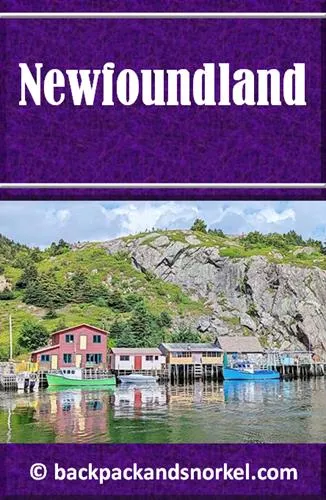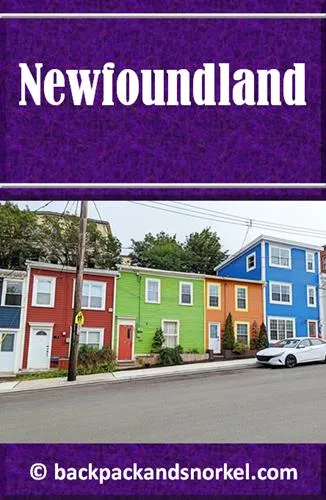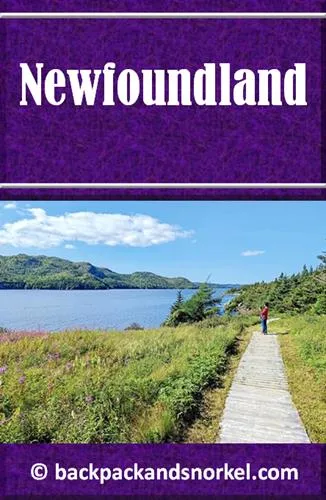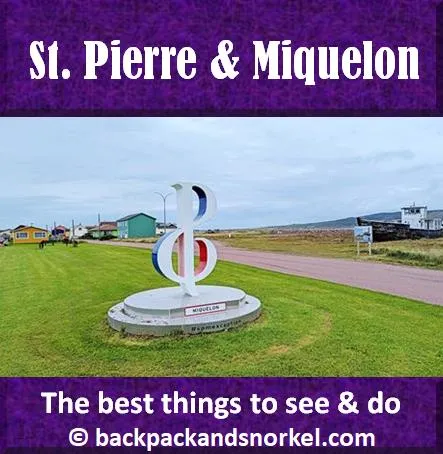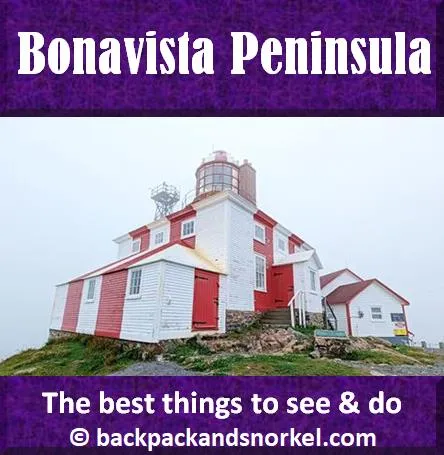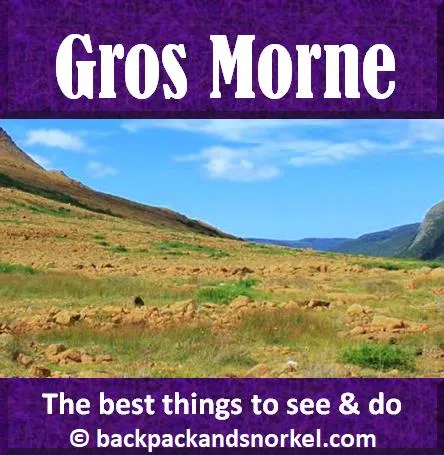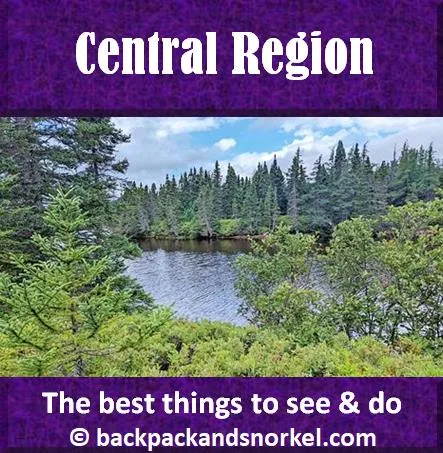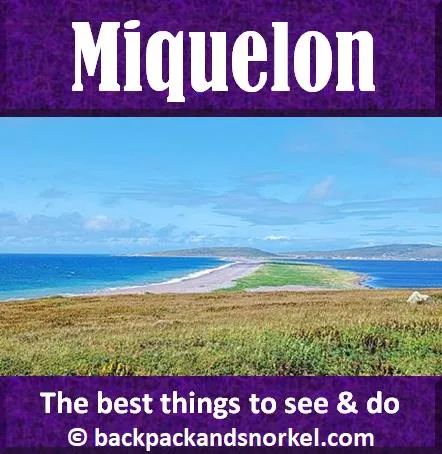Backpack and Snorkel Travel Guide for 3 weeks in Newfoundland - Newfoundland Purple Travel Guide
Newfoundland is a sparsely populated island with friendly locals and lots of gorgeous scenery. We provide detailed information and a self-guided tour with the best things to see and we show lots of photos so you know what you can expect.
Depending on the time of year, you see icebergs, whales, puffins, northern lights, and you can hike through diverse landscapes from rolling hills, boreal forests, rugged cliffs, and pebble beaches to climbing hills with gorgeous 360-degree views, and small towns with colorful houses.
In addition to beautiful scenery, Newfoundland has a long history of human occupation. With indigenous people settling here more than 4,000 years ago and Newfoundland being among the first places that were settled by the Europeans, you can watch history come alive in many places on the island.

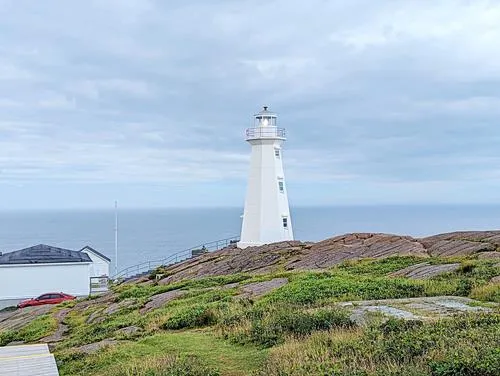
Table of contents
General Information about Newfoundland |
Itineraries for your Newfoundland and St. Pierre and Miquelon visit |
Self-guided tour of Newfoundland |
General Information about Newfoundland
How much time do you need to visit Newfoundland?
Newfoundland itineraries are typically 2-3 weeks long.
The eastern part of the island can be seen in about a week and we recommend adding the French islands of St Pierre and Miquelon to bring the itinerary to two weeks.
If you don’t mind driving a lot, then you can add another week to explore central Newfoundland and the highlights in the western part of the island.
You can find different itineraries here.
What is the best time to visit Newfoundland?
The best time to visit Newfoundland is in summer.
- July - September: This is the peak tourist season in Newfoundland. July is the driest month and August the warmest (average high: 69F, 20C). Don’t be surprised to encounter thick fog during the summer months – this is just the way it is and a reason why you see so many colorful houses on the island. Summer is also the best time to see whales (up until mid-August) and puffins.
Several festivals are held in St. John’s in July and August:
- NL Folk Festival
- Royal St. John’s Regatta
- George Street Festival - October - December: After the summer season, many tourist attractions shut down. The weather gets colder, snow arrives and it gets windier. At this time of year, hiking is the primary tourist activity. In St. John’s George Street is still partying. You can visit Rocktober concerts and the George Street Mardi Gras Costume Party in October George Street Festival.
December sees towns in Christmas decorations and some special Newfoundland specialties:
- Mummers Festival with the Parade
- on Christmas eve: Tibb’s Eve parties - January - March: The days are short; snow is on the ground and it is cold. Newfoundlanders engage in Snowmobiling and skiing. There are only two ski resorts in Newfoundland, in the central and western part of the island: Marble Mountain Resort and White Hills Resort.
- April - June: The weather gets warmer and snow starts to melt, but it is still cold. The weather is often rainy and the sky is grey. Spring flower start blooming and tourist attractions start to open in May.
From late May to early June, iceberg viewing is at its busiest at the Iceberg Alley, the area near Trinity in the Bonavista Peninsula. Don’t be surprised to see companies harvest icebergs for brewing beer and different liquors, as icebergs contain some of the purest on the planet.
Below is the climate that you can expect on your trip to St. John’s in Newfoundland:
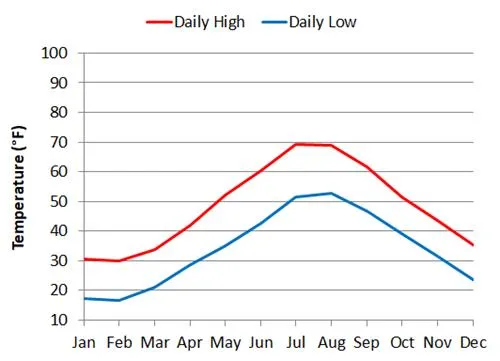
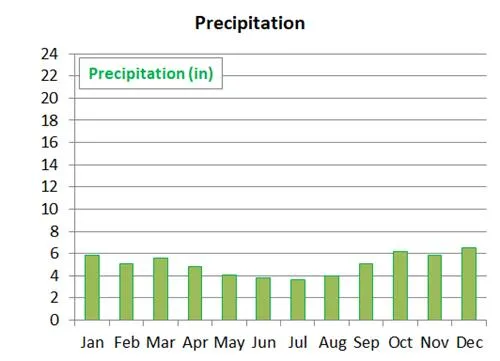
Below is the climate that you can expect on your trip to Bonavista in Newfoundland:
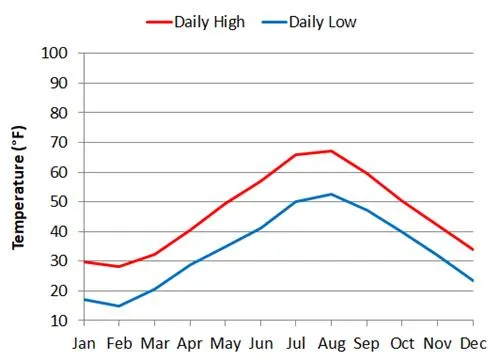
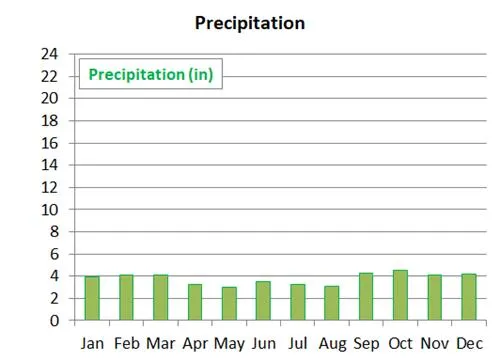
Below is the climate that you can expect on your trip to St. Anthony in Newfoundland:
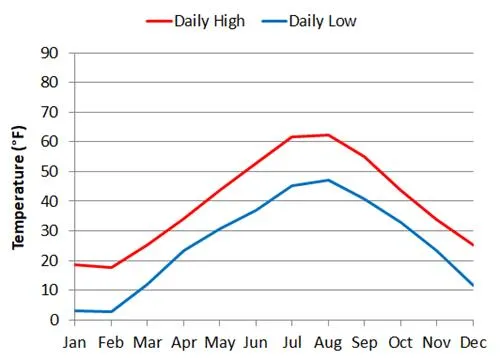
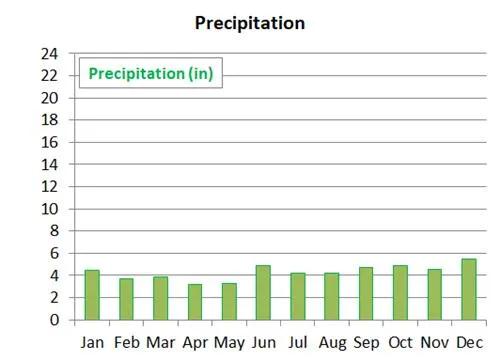
The highlights of the history of Newfoundland
- Approx.2000 BC: beginning of the settlement of Newfoundland the Dorset culture
- 1000 AD: no signs of the Dorset culture are found in Newfoundland anymore
- Approx. 1000 AD: Norse Icelandic explorer Bjarni Herjólfsson gets off course on this voyage from Iceland to Greenland due to the weather and discovers an unknown coastline. He thinks it is Greenland and does not land.
- 1014: Icelandic explorer Leif Erikson starts an expedition to the unknown coastline. He lands in Newfoundland and establishes a short-lived settlement called Leifsbudir. Because the land is full of vines and grapes, he calls it: Vinland (Wineland). Archeologists think that Leifsbudir is what we now call the L'Anse aux Meadows.
- After 1000 AD: The Beothuk settle Newfoundland from Labrador
- 1497: Italian explorer John Cabot who is sailing under the English flag, likely lands in Cape Bonavista
- 16th century: Basque whalers establish seasonal whaling stations on the island and call it Terra Nova (New Land)
- 1583: English adventurer Humphrey Gilbert claims Newfoundland as England's first overseas colony while French and Portuguese vessels are in the port of St. John's. Gilbert is lost at sea during his return voyage and no plans to establish a permanent settlement reach Britain
- 1610: John Guy and 39 colonists sail from Bristol, England to Cuper's Cove to establish a permanent settlement
- 1620: English fishermen dominate the east coast and French fishermen dominate the south coast and northern peninsula
- Sometime after 1630: The town of St. John's is established as a permanent settlement
- 1665: Dutch admiral Michiel de Ruyter raids St. John’s and causes severe damage
- 1673: St. John’s fends off a second Dutch attack
- 1696: During the Avalon Peninsula Campaign, France destroys 23 English settlements along the coast of the Avalon Peninsula
- 1705: France forces attack St. John’s but fail to capture the city at the Siege of St. John's
- 1708: France forces capture St. John’s at the Battle of St. John's. Rather than holding St. John's, it was ordered to be abandoned and its fortifications to be destroyed. The English start rebuilding the city
- 1713: In the Treaty of Utrecht, France cedes Newfoundland, which becomes a British colony
- 1762: France captures St. John’s and that leads to the Battle of Signal Hill, which is the final battle of the Seven Years' War in North America (French and Indian War) in which the British emerge victorious and the French army surrenders
- 1763: In the Treaty of Paris, France retains the islands of St. Pierre and Miquelon and the fishing rights on the west coast
- World War I: Newfoundland’s population is approx. 250,000. As a British colony, Newfoundland sends 5,482 men overseas into the war. Nearly 1,500 are killed and 2,300 wounded
- 1855: Newfoundland becomes the first British colony to achieve responsible government in 1855, giving it a degree of self-governance that will last until 1934
- 1934: Newfoundland's economy collapses during the Great Depression and the government is replaced by the Commission of Government, a non-elected body, which will govern until 1949
- World War II: Newfoundland plays a strategic role in the North Atlantic. Multiple military bases are established and US military forces are stationed in Newfoundland
- 1949: Newfoundland joins Canada as its 10th province
- 1856: The first successful transatlantic telegraph cable is laid between Newfoundland and Ireland, enhancing global communication
- 1980: Newfoundland and Labrador adopts its official flag, featuring a pink and white background with a stylized blue pitcher plant.
Driving a car in Newfoundland
Rental cars are expensive in Newfoundland, but for most vacationers a must-have as there is only limited public transportation. You can book rental cars in St. John's here.
Public Transportation in Newfoundland
St. John’s has a fairly good public bus system and taxis that can bring you to any address within the city.
At the time of writing, Uber and Lyft are not operating in Newfoundland.
If you need to travel outside St. John’s, your public transportation options are limited.
- PAL Airlines provides flights to many smaller airports in Newfoundland
- DRL-LR provides daily cross-island bus service
- Foote’s Taxi provides daily shuttle service between St. John’s and Fortune
Money and Credit Cards in the Newfoundland
The currency used in Newfoundland is the Canadian Dollar. You can find the current exchange rate here.
Credit cards (MasterCard and VISA) are widely accepted, except at parking meters in St. John’s.
Tap water in Newfoundland
Tap water is safe to drink in much of Newfoundland, but it has a more or less strong chlorine taste and therefore we preferred to filter it to remove the chlorine taste. In many rural areas, you will notice tap water in various yellow shades. That is ground water and should not be consumed.
Especially after prolonged and heavy rains, you may find boil water advisories in smaller communities. Ask your host if the water can be consumed.
Telephone
The country code for Newfoundland is: +1
In which Time Zone is Newfoundland
Newfoundland is on Newfoundland Time: UTC/GMT -2:30 h and observes Daylight saving time (DST).
You can find the current local time here.
Visa requirements for Newfoundland
As a part of Canada, Newfoundland has the same entry regulations as the rest of Canada. You can check if you need a visa to enter Newfoundland here.
Languages spoken in Newfoundland
English is the first and most commonly spoken language in Newfoundland. Since Canada is a bilingual country, locals will be able to converse in French, too.

Itineraries for your Newfoundland and St. Pierre and Miquelon visit
The best ways to experience this part of the world is by combining Newfoundland, St. Pierre and Miquelon. This can easily be done on a 2-or 3-week trip.
Newfoundland is big. The eastern part can be explored in nine days. If you don’t mind driving a bit, then you can add Central- and western Newfoundland.
Either way, we recommend adding the French islands of St. Pierre and Miquelon to your itinerary.
If you don’t want to leave Canada or if you only plan to visit St. Pierre and Miquelon – no problem. Just delete the islands that you don’t want to visit from the itineraries below.
Two-week itinerary for your Newfoundland and St. Pierre and Miquelon visit
One of the best ways to experience Newfoundland, St. Pierre and Miquelon is on a 2-week trip.
If you are not interested in visiting all 3 islands, then just delete the appropriate days from the itinerary below.
Our two-week itinerary allows you to discover eastern Newfoundland for nine days, Miquelon for 2 days and St. Pierre for 3 days.
You can use this itinerary as it is or modify it to fit your interests and travel style.
|
Day |
Night |
Day 1 |
Flight to St. John’s; St. John’s (Signal Hill National Historic Site and The Queen's Battery Barracks; Jellybean Row; Harbourside Park; Water Street; George Street) |
St. John's |
Day 2 |
St. John’s (Colonial Building; Government House; Basilica of St. John the Baptist; Anglican Cathedral of St. John the Baptist; Mile 0 - Trans Canada Highway; City of St. John's Welcome Centre; Cape Spear; Fort Amherst; screech-in ceremony downtown at Christian’s Pub |
St. John's |
Day 3 |
drive to Trinity (3h); Trinity (explore Trinity: Upper Gun Hill trail; whale watching boat tour); Skerwink trail; Port Rexton Brewery) |
Trinity area |
Day 4 |
Elliston (root cellars; Puffin watching); Bonavista (Dungeon Provincial Park; Cape Bonavista Lighthouse; Ryan Premises National Historic Site; maybe: Ye Matthew Legacy) |
Trinity area |
Day 5 |
Terra Nova National Park (Ochre Hill trail; Heritage Trail); drive to Fortune |
Fortune area |
Day 6 |
Grand Bank (Provincial Seamen's Museum; Grand Bank Lighthouse; Burin (Burin Heritage Square; Cook's Lookout Trail); Lord’s Cove Beach |
Fortune area |
Day 7 |
Ferry to Miquelon (2:30pm-4:30pm); explore town |
Miquelon |
Day 8 |
Maison de la Nature et de l'Environment; hike to Le Cap de Miquelon |
Miquelon |
Day 9 |
Tour of the island of Miquelon-Langlade with the Auberge de l’île; ferry to St. Pierre |
St. Pierre |
Day 10 |
Zodiac tour; guided tour at Ile aux Marins; L'Arche Museum and Archives |
St. Pierre |
Day 11 |
hike to L'Anse-a-Henry; guided island tour or explore town |
St. Pierre |
Day 12 |
Ferry to Fortune (10am-11am); drive to St. John’s (4h) and during the trip: Avondale Railway Museum; Shipwreck at Conception Harbour; Jack Axes |
St. John's |
Day 13 |
The Tolt; hike La Manche Provincial Park (1h drive); Colony of Avalon (0:25h); Cape Race Lighthouse; dinner at Chafe's Landing |
St. John's |
Day 14 |
The Rooms; Quidi Vidi (Wharf at Quidi Vidi; Quidi Vidi Brewery; Quidi Vidi Village Artisan Studios; Quidi Vidi Lake Trail); Bowring Park |
St. John's |
Day 15 |
Flight back home |
|
Three-week itinerary for your Newfoundland and St. Pierre and Miquelon visit
If you want to visit the highlights of Newfoundland, and also St. Pierre and Miquelon, then you should reserve three weeks to discover this part of the world.
If you are not interested in visiting all 3 islands, then just delete the appropriate days from the itinerary below.
Our three-week itinerary allows you to discover the highlights of Newfoundland for two weeks, Miquelon for 2 days and St. Pierre for 3 days.
You can use this itinerary as it is or modify it to fit your interests and travel style.
|
Day |
Night |
Day 1 |
Flight to St. John’s; St. John’s (Signal Hill National Historic Site and The Queen's Battery Barracks; Jellybean Row; Harbourside Park; Water Street; George Street) |
St. John's |
Day 2 |
St. John’s (Colonial Building; Government House; Basilica of St. John the Baptist; Anglican Cathedral of St. John the Baptist; Mile 0 - Trans Canada Highway; City of St. John's Welcome Centre; Cape Spear; Fort Amherst; screech-in ceremony downtown at Christian’s Pub |
St. John's |
Day 3 |
drive to Trinity (3h); Trinity (explore Trinity: Upper Gun Hill trail; whale watching boat tour); Skerwink trail; Port Rexton Brewery) |
Trinity area |
Day 4 |
Elliston (root cellars; Puffin watching); Bonavista (Dungeon Provincial Park; Cape Bonavista Lighthouse; Ryan Premises National Historic Site; maybe: Ye Matthew Legacy) |
Trinity area |
Day 5 |
Terra Nova National Park (Ochre Hill trail; Heritage Trail); drive to Rocky Harbour |
Rocky Harbour |
Day 6 |
Gros Morne National Park (The Tablelands; Southeast Brook Falls or Lobster Cove Head) |
Rocky Harbour |
Day 7 |
Gros Morne National Park (Green Point Geological Site; boat ride down Western Brook Pond through the fjords) |
Rocky Harbour |
Day 8 |
L’anse Aux Meadows |
St. Anthony |
Day 9 |
Flower’s Cove (Marjorie Bridge to thrombolites); drive to Grand Falls-Windsor |
Grand Falls-Windsor |
Day 10 |
Grand Falls-Windsor (Salmonid Interpretation Centre; Papa's Sweet Shop); drive to Fortune |
Fortune area |
Day 11 |
Grand Bank (Provincial Seamen's Museum; Grand Bank Lighthouse; Burin (Burin Heritage Square; Cook's Lookout Trail); Lord’s Cove Beach |
Fortune area |
Day 12 |
Ferry to Miquelon (2:30pm-4:30pm); explore town |
Miquelon |
Day 13 |
Maison de la Nature et de l'Environment; hike to Le Cap de Miquelon |
Miquelon |
Day 14 |
Tour of the island of Miquelon-Langlade with the Auberge de l’île; ferry to St. Pierre |
St. Pierre |
Day 15 |
Zodiac tour; guided tour at Ile aux Marins; L'Arche Museum and Archives |
St. Pierre |
Day 16 |
hike to L'Anse-a-Henry; guided island tour or explore town |
St. Pierre |
Day 17 |
Ferry to Fortune (10am-11am); drive to St. John’s (4h) and during the trip: Avondale Railway Museum; Shipwreck at Conception Harbour; Jack Axes |
St. John's |
Day 18 |
The Tolt; hike La Manche Provincial Park (1h drive); Colony of Avalon (0:25h); Cape Race Lighthouse; dinner at Chafe's Landing |
St. John's |
Day 19 |
The Rooms; Quidi Vidi (Wharf at Quidi Vidi; Quidi Vidi Brewery; Quidi Vidi Village Artisan Studios; Quidi Vidi Lake Trail); Bowring Park |
St. John's |
Day 20 |
Flight back home |
|
Self-guided tour of Newfoundland
Where do you want to go now?
Other popular Purple Travel Guides you may be interested in:
Like this Backpack and Snorkel Purple Travel Guide? Pin these for later:
